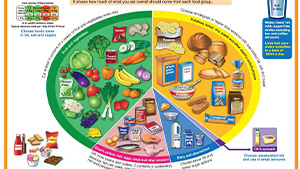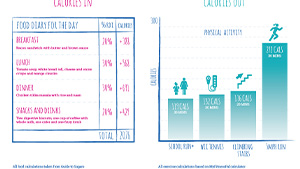HEALTHY BALANCED DIET
Current UK Government guidance is that approximately 50% of our total calorie intake should come from carbohydrates, including sugars and starches. (65) When it comes to sugars (those added to food and drink, or naturally present in honey, syrups and unsweetened fruit juices) they should account for no more than 5% of total dietary energy intake from two years upwards. (66) That means no more than 19g/day for 4–6 years, no more than 24g/day for 7–10 years and no more than 30g/day for those aged 11 and over. (59)

The rest of the diet should contain moderate amounts of protein from a variety of different sources, including beans, pulses, fish, eggs and meat, and some fat. Although a small amount of dietary fat is an essential part of the diet, fat from all sources is high in energy (calories) and therefore, to avoid consuming more calories than are needed, fat should be limited in the diet. Too much saturated fat should also be avoided, and can be swapped for unsaturated fat were possible, for example by cutting visible fat off meat and using plant-based oils like rapeseed or olive oil. Overall, the diet should be made up of a balance of different foods from the Eatwell Guide to constitute a healthy, varied and balanced diet. (43)
The key to a healthy balanced diet is balance and having the right amount of energy (calories) from a variety of foods and drinks. A balanced diet is the best way to get the protein, energy, vitamins, minerals and fibre that we all need to live a healthy lifestyle.
This includes a mixture of food and drink from the five main food groups. Most of what you eat should come from the two biggest– fruit and vegetables and starchy foods like bread, cereals, rice and pasta. Good sources of protein are lean meat, fish, eggs, lower fat milk and dairy products but these should be consumed in smaller amounts. Finally, foods and drinks high in fat, salt and/or sugar can be enjoyed in limited amounts. (46)
10 TIPS FOR A HEALTHY BALANCED DIET
With so much conflicting information it can be confusing to know how you and your family can make healthier choices. While your doctor can advise you on the best diet for your individual needs, these tips may be useful to think about as part of planning family mealtimes.
-
Base your meals on starchy foods: bread, potatoes, pasta, rice, and noodles all contain fewer than half the calories of fats. Products based on whole grains also contain more fibre, which is important for digestive health. Eating more dietary fibre helps reduce the risk of constipation and may make you feel fuller for longer. (45)
-
Eat a variety of fruit and vegetables as they contain different combinations of vitamins and minerals. Whether fresh, frozen, dried or tinned, they all count!
-
Eat fish on regular basis. Aim for at least two portions per week, one of which should be oily e.g. salmon, sardines, mackerel or trout.
-
Try to eat less salt by adding less during cooking and at the table and choose lower salt products. This means no more than 6g per day for adults and even less for children. (46) Too much salt in the diet can increase your risk of developing high blood pressure.
-
Drink plenty of fluids aiming for around 6-10 glasses per day. (43) Water is the healthiest option to ensure you stay hydrated and minimise your calorie intake.
-
Think about whether there are simple ways that you can reduce your calorie intake. This could be as simple as swapping a bag of crisps for an apple, limiting alcohol consumption, or taking one less sugar in your tea or coffee. Remember that the Reference Intake for total sugars as part of your diet is 90g a day for adults. This Reference Intake is based on the requirements of an average female with no special dietary requirements and an assumed energy intake of 2,000 calories. (44)
-
Start each day with a healthy breakfast. Whole grain cereals, porridge or wholemeal toast will provide you with a good balance of fibre, vitamins and minerals.
-
If you've decided to lose weight, set realistic goals and keep physically active. A healthy weight loss rate is around 0.5 to 1kg (1lb-2lb) per week as recommended by the NHS. (68)
-
Consider whether swapping a big dinner plate for a smaller one could help you eat a little bit less and eating more slowly.
-
Get active! The UK Government recommends at least 150 minutes of moderate exercise or 75 minutes of more vigorous exercise including strength exercises on 2 or more days a week for adults (ages 19-64) each week. Moderate exercises include cycling or a brisk walk and vigorous exercise includes running and tennis. For more detailed advice go to the UK Chief Medical Officers' Physical Activity Guidelines. (68)



